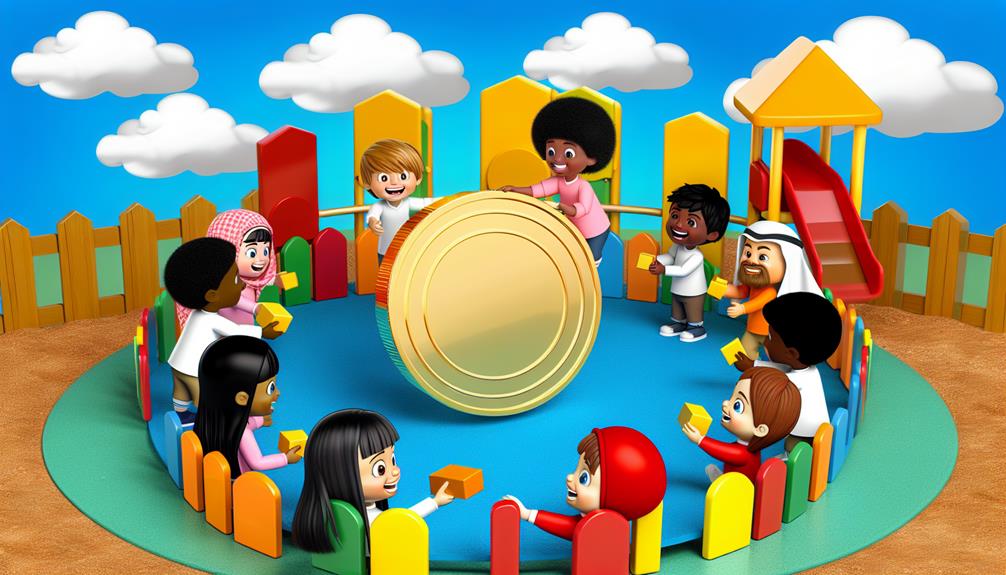Bitcoin is a form of digital money, created in 2009, that you can use to buy items or save, without needing banks or governments to handle it. It operates on a system called blockchain, which records transactions transparently on computers worldwide, making everything secure and visible. You can earn Bitcoin by a process called mining, where people solve complex puzzles, and you can store it safely in digital wallets. Each Bitcoin has a finite number, ensuring its value, and it's becoming more popular for buying and investing. To grasp the intricacies and power of Bitcoin, you'll find compelling insights ahead.
Key Takeaways
- Bitcoin is like digital money you can use on the internet to buy things, just like using coins or dollars.
- It was created by a person named Satoshi in 2009 and isn't controlled by any bank or government.
- There are only 21 million Bitcoins, so they are special and can be seen as valuable, like rare toys.
- People use a big book called the blockchain to keep track of all the Bitcoin transactions, making it safe and clear.
- You can store your Bitcoin in a digital wallet, like a piggy bank, to keep it safe from others.
What Is Bitcoin?
Bitcoin is a special kind of digital money that lives on the internet, and it's not controlled by any government or bank. It was created in 2009 by someone using the name Satoshi Nakamoto, who wanted to help people send money directly to each other without needing a middleman. This unique feature not only empowers users but also simplifies transactions.
One vital aspect of Bitcoin is its limited supply—there will only ever be 21 million Bitcoins available, making it as scarce as a collection of rare toys. This scarcity contributes to its value, as people recognize its potential as a digital asset.
All Bitcoin transactions are recorded in a public ledger called the blockchain, which everyone can access. This transparency guarantees that each transaction is honest and verifiable, eliminating the possibility of fraud.
Additionally, people can earn new Bitcoins through a process known as mining, where powerful computers solve complex math problems. This mining process secures the network while introducing new Bitcoins into circulation.
Understanding Bitcoin's structure and limitations is essential for anyone looking to navigate the world of digital currency confidently.
How Does Bitcoin Work?
When you want to send Bitcoin, it works like sending an email, but instead of a bank keeping track of everything, a special computer system called the blockchain does the job.
Bitcoin can be sent directly from one person to another over the internet, without the need for traditional financial institutions. Each time you send or receive Bitcoin, your transaction gets grouped with others into a "block." This block is then added to a long chain of previous blocks, which creates the entire blockchain, ensuring a secure and transparent record of all transactions.
To maintain this system, miners play an essential role. They use powerful computers to solve complex math problems, verifying and confirming these transactions. For their efforts, miners earn new Bitcoins as a reward, which helps keep the system running smoothly.
Importantly, there will only ever be 21 million Bitcoins, making them limited and consequently special, much like a collector's item. When you send Bitcoin, it typically costs very little, often just a tiny piece of a cent, and these transactions usually happen much faster than traditional bank transfers, making Bitcoin a convenient digital currency.
Bitcoin's Unique Features
Living entirely on the internet, Bitcoin stands out as a unique type of money that isn't controlled by any bank or government. One of its most remarkable features is its limited supply; there will only ever be 21 million bitcoins. This scarcity makes it similar to collecting rare baseball cards, giving it a strong potential to act as a store of value.
You can even break down each bitcoin into tiny pieces called Satoshis; one bitcoin has 100 million Satoshis. This flexibility means you can buy just a little bit if you want, making it accessible to everyone.
Each transaction is recorded on a public ledger known as the Bitcoin Blockchain. This big, transparent notebook guarantees that every transaction is visible, reducing the chances of cheating and fraud in a way that traditional currencies can't achieve.
Additionally, Bitcoin's digital nature allows you to send it to anyone, anywhere in the world, incredibly fast and at a low cost. This combination of features makes Bitcoin not just a currency, but an innovative financial tool that's reshaping how we think about money and value in our increasingly digital world.
Understanding Blockchain Technology
When you buy or sell something using Bitcoin, that transaction is recorded in this digital notebook, ensuring everyone is informed about what happened. This transparency allows everyone to trust the process since they can verify the information themselves.
The blockchain technology is stored on numerous computers around the world, enhancing its security and making it nearly impossible for anyone to alter the data without everyone noticing.
Thanks to the Bitcoin protocol, transactions can occur rapidly, eliminating the need for banks as intermediaries, which often slow things down. This decentralized approach empowers you, giving you direct control over your digital money while maintaining a reliable record of all transactions.
Understanding blockchain is essential for grasping how Bitcoin operates effectively in this digital age.
The Role of Mining
Mining plays an essential role in the Bitcoin world, acting like a big math puzzle that computers race to solve. This process not only helps keep Bitcoin safe but also tracks who owns it. When computers solve these puzzles, they're rewarded with new Bitcoins, which is how new coins are created. With a capped limit of 21 million Bitcoins, mining guarantees we don't have too many coins floating around.
Here's a simple breakdown:
| What Happens | Why It Matters |
|---|---|
| Computers solve puzzles | Keeps Bitcoin secure |
| New Bitcoins are created | Maintains limited supply |
| Transactions added every 10 minutes | Updates ownership records |
| Difficulty increases with more miners | Guarantees fairness |
Every ten minutes, new transactions are added to the Bitcoin blockchain, and as more people want to mine, the puzzles become harder, maintaining a level playing field. This track record of mining is vital for the network's stability, guaranteeing only legitimate transactions are processed while creating new Bitcoins responsibly. So, mining isn't just about earning coins; it's fundamental for Bitcoin's security and integrity.
Buying and Storing Bitcoin
When you want to buy Bitcoin, you can use your regular money to trade for it, choosing between centralized exchanges that require your personal info and decentralized ones that keep your identity private.
Once you've purchased Bitcoin, it's essential to transfer it to your own wallet, whether it's a software app on your phone or a secure hardware device, to protect your investment from potential risks associated with exchanges.
Always prioritize the safety of your Bitcoin by keeping it in your personal wallet, as this greatly reduces the chances of losing it to hacks or other unforeseen issues.
Where to Buy Bitcoin
Buying Bitcoin is as simple as visiting a special website called an exchange, where you can trade your regular money, like dollars, for this digital currency. To get started, you'll need to create an account on the exchange you choose.
There are two main types of exchanges: centralized exchanges, which require you to provide personal information, and decentralized exchanges, where you can buy Bitcoin without revealing your identity.
Once your account is set up, you can easily buy Bitcoin, whether you want a whole coin or just a fraction, like 0.0005 BTC—similar to buying a single slice of pizza.
However, remember that buying Bitcoin is only part of the process. It's essential to move your Bitcoin from the exchange to your own wallet, which acts like a treasure chest to keep your digital currency safe.
You can choose from various wallet options, including software wallets on your computer or hardware wallets that resemble small gadgets.
Types of Wallets
There are various types of wallets to help you keep your Bitcoin safe, each with its own perks. The most common are software wallets, which you can easily access on your computer or smartphone. They're user-friendly and great for quick transactions, but because they're connected to the internet, they can be vulnerable to hacking.
That's where hardware wallets come in. Hardware wallets are like special USB drives that store your Bitcoin offline, providing a much higher level of security against online threats. With hardware wallets, your private keys—those secret codes that let you send and receive Bitcoin—are kept safe and sound away from prying eyes. This makes it considerably harder for anyone to steal your money.
Regardless of the type of wallet you choose, it's essential to move your Bitcoin from exchanges where you buy it to your personal wallet. This gives you better control over your funds and a safer way to manage your digital money.
Security Tips for Storage
Your Bitcoin's safety is a top priority, and knowing how to store it securely is vital. To protect your precious assets, start by transferring your Bitcoin from exchanges to a personal wallet. This simple step shields you from potential hacks and theft. For the highest level of security, consider using hardware wallets, like the ELLIPAL Titan 2 or Cypherock X1, which allow for offline storage, keeping your Bitcoin safe from online threats.
Here are some critical security tips to follow:
| Action | Importance |
|---|---|
| Use hardware wallets | Provides offline protection |
| Enable two-factor authentication (2FA) | Adds an extra layer of security |
| Regularly update wallet software | Guarantees you have the latest protections |
| Be cautious of phishing scams | Protects you from fraudulent platforms |
Investment Potential of Bitcoin
Bitcoin's investment potential is often compared to that of gold, thanks to its limited supply of only 21 million coins. This scarcity makes it valuable, much like precious metals, which is why many people consider it a smart addition to their investment portfolio.
If you're thinking about purchasing Bitcoin, investment advice suggests holding onto it for around 4-5 years can greatly grow your savings. Over time, Bitcoin's value has increased, peaking at an impressive $68,000 in November 2021, showcasing its potential for high returns.
Unlike regular money, Bitcoin can't be printed endlessly, which helps maintain its purchasing power against inflation. This unique quality makes it a hedge against economic downturns, appealing to those looking to preserve their wealth.
You don't need a fortune to start investing in Bitcoin; even a small amount, like $50-$100, can kick off your journey into this digital currency.
As you consider your options, remember that while Bitcoin holds remarkable investment potential, it's crucial to do your research and understand the market dynamics before diving in. This way, you'll be better equipped to make informed decisions regarding your financial future.
Safety and Risks
Investing in Bitcoin can be exciting, but it's important to understand the safety and risks involved. Unlike traditional banking systems, Bitcoin lacks certain safety nets, meaning if you lose your Bitcoin, you mightn't get it back. This makes it essential to handle your investment wisely.
Here are some key points to take into account:
- Secure Your Wallet: Just as you'd protect your toys, keep your Bitcoin in safe wallets to shield it from hackers.
- Beware of Scams: Many people fall victim to scams that promise quick riches. Always verify the sources before investing.
- Price Volatility: The price of Bitcoin can rise and fall dramatically. If you buy at a high price and it drops, you could lose a lot of money.
- Know Your Local Laws: Some countries have regulations regarding Bitcoin, so it's important to be aware of the legal landscape where you live to avoid potential issues.
Future of Bitcoin
The future of Bitcoin looks promising as more people and businesses start to accept it, transforming it into a common way to buy things like we do with dollars.
Technological advancements, such as the Lightning Network, will make transactions faster and cheaper, while regulatory changes will help guarantee that users are protected without stifling innovation.
However, keep in mind that Bitcoin's price might still fluctuate a lot, so staying informed about these trends is essential for steering through this evolving landscape.
Growing Adoption Trends
More businesses are jumping on the Bitcoin bandwagon, making it easier for you to use it in your daily life. This growing adoption trend is transforming how you buy goods and services, and it's just the beginning.
Here are four ways this shift is happening:
- Many retailers now accept Bitcoin directly, allowing you to purchase everything from coffee to electronics.
- The Lightning Network is being developed to speed up transactions, making them cheaper and more efficient.
- Major financial institutions are exploring Bitcoin integration, signaling a shift in traditional finance's acceptance of cryptocurrency.
- Countries worldwide are considering regulations that could legitimize Bitcoin, providing a safer environment for users like you.
As these trends continue, you'll likely find more ways to spend Bitcoin, making it a practical choice.
With its growing acceptance, Bitcoin isn't just a digital currency anymore; it's becoming a significant player in the economy. This expanding ecosystem indicates that Bitcoin's future is bright, and as more people adopt it, you can expect even greater convenience in using it for everyday transactions.
The road ahead for Bitcoin looks promising!
Regulatory Challenges Ahead
As Bitcoin grows in popularity, it's also facing a series of regulatory challenges that could shape its future. Governments around the world are still figuring out how to classify and control cryptocurrencies, which directly impacts how you can use and accept Bitcoin. Some countries are likely to impose strict regulations on Bitcoin exchanges and transactions, aiming to prevent fraud and protect consumers.
Unfortunately, this could limit your access to Bitcoin and how easily you can buy or sell it.
Moreover, ongoing discussions about taxation on Bitcoin transactions and capital gains could change how you and businesses engage with this digital currency. If these regulations become too burdensome, they might discourage mainstream adoption, making it harder for Bitcoin to thrive.
Additionally, the emergence of central bank digital currencies (CBDCs) may pose competition to Bitcoin, potentially altering the landscape of digital finance.
Regulatory clarity is vital; it could either foster greater adoption by mainstream institutions or create barriers that hinder growth. Understanding these regulatory challenges is essential for steering the future of Bitcoin and its relationship with traditional fiat currencies.
Technological Innovations Emerging
While Bitcoin navigates regulatory challenges, exciting technological innovations are emerging that could transform its future. These advancements not only enhance Bitcoin's functionality but also reinforce its status as digital gold.
Here are four key innovations to watch:
- Lightning Network: This technology enables faster and cheaper transactions, allowing users to make instant payments, making Bitcoin more practical for everyday use.
- New Cryptocurrencies and Blockchain Projects: Inspired by Bitcoin, these projects expand the digital asset ecosystem, introducing diverse functionalities and use cases.
- Scalability Solutions: To address Bitcoin's scalability challenges, innovative solutions are being developed, aiming to increase the number of transactions processed per second on the network, ensuring it can handle growing demand.
- Decentralized Finance (DeFi): By leveraging Bitcoin's blockchain, DeFi applications create new financial products and services that operate outside traditional banking systems, opening new doors for users.
As these technological innovations unfold, they hold the potential to elevate Bitcoin's acceptance and institutional investment, paving the way for a bright future in the cryptocurrency landscape.
Keep an eye on these developments; they're reshaping what Bitcoin can be.
Conclusion
In conclusion, understanding Bitcoin is like grasping the concept of money in a digital world where everyone can play. As you navigate its complexities—from blockchain technology to mining—you'll discover both opportunities and risks. Remember, "Don't put all your eggs in one basket." By diversifying your approach and remaining informed, you can make wise decisions about Bitcoin. Embrace this revolutionary currency with caution, but don't shy away from exploring its potential to reshape the future of finance.




